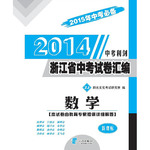题目内容
8. John preferred to go into business alone anyone else.(team)
约翰情愿独自经商,不愿与人合伙。
8. rather than team up with

练习册系列答案
 中考利剑中考试卷汇编系列答案
中考利剑中考试卷汇编系列答案
相关题目
题目内容
8. John preferred to go into business alone anyone else.(team)
约翰情愿独自经商,不愿与人合伙。
8. rather than team up with

 中考利剑中考试卷汇编系列答案
中考利剑中考试卷汇编系列答案